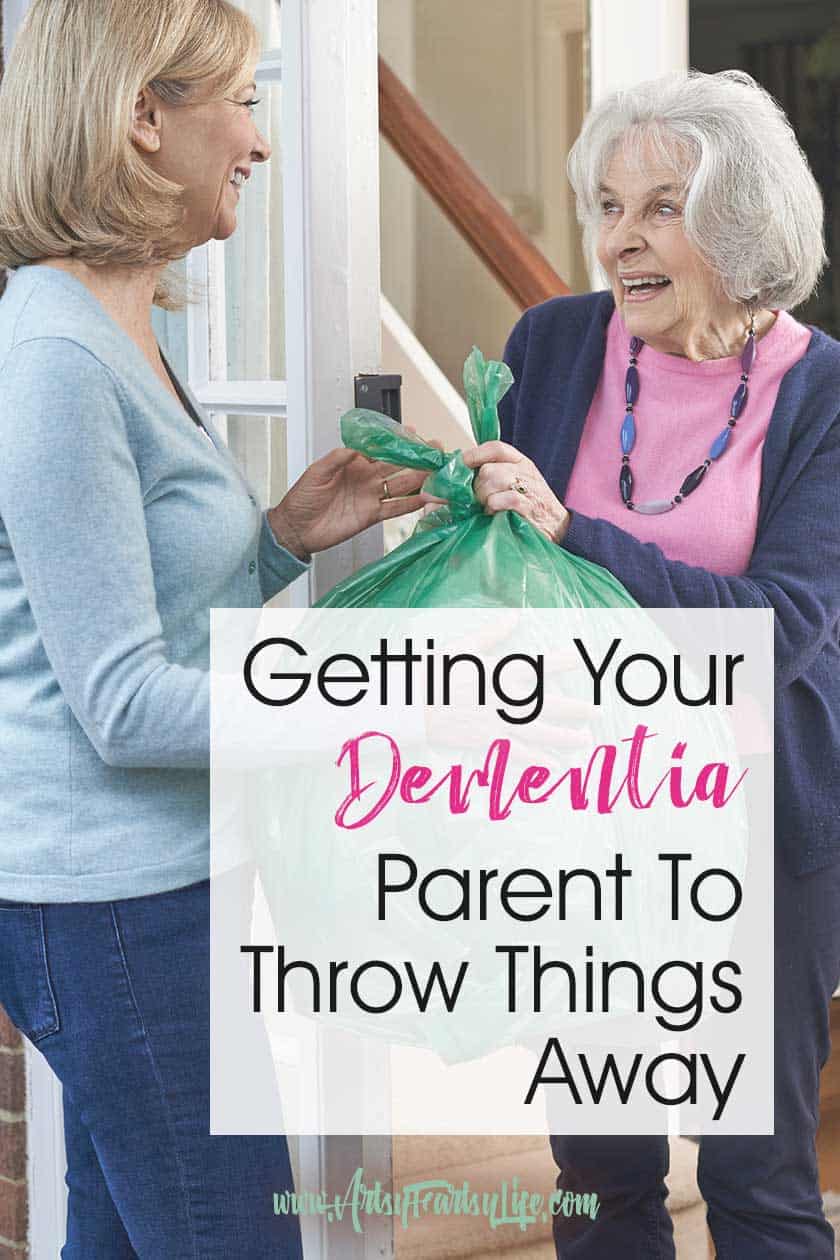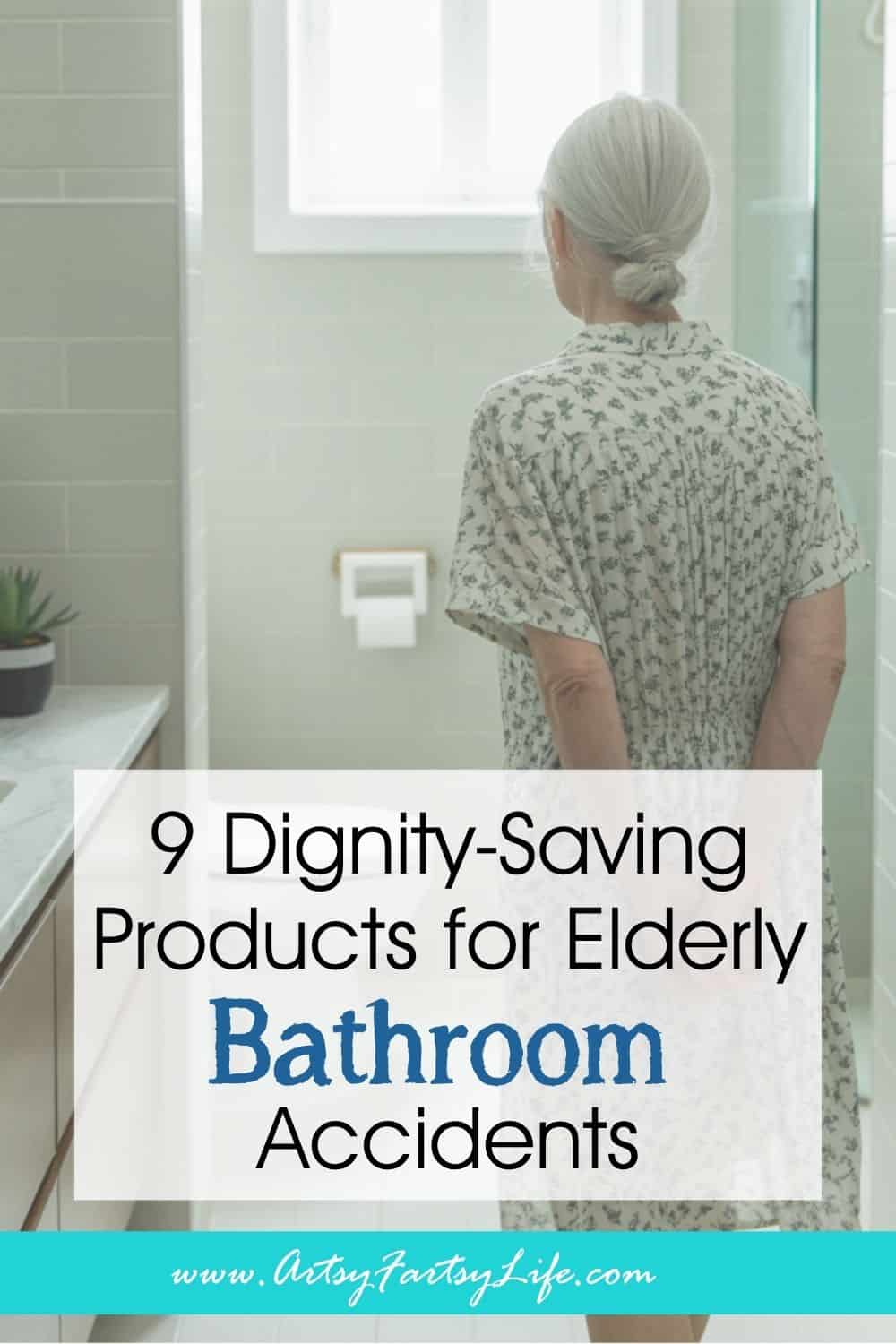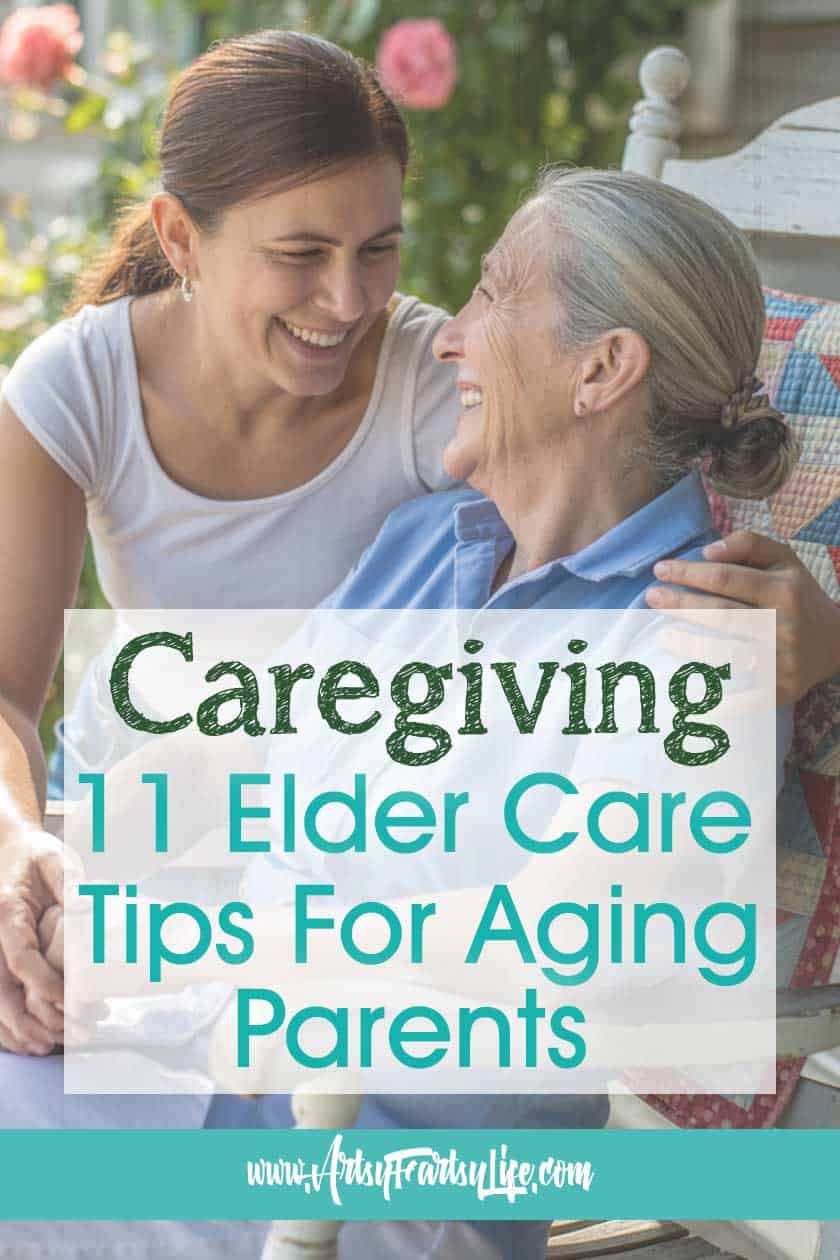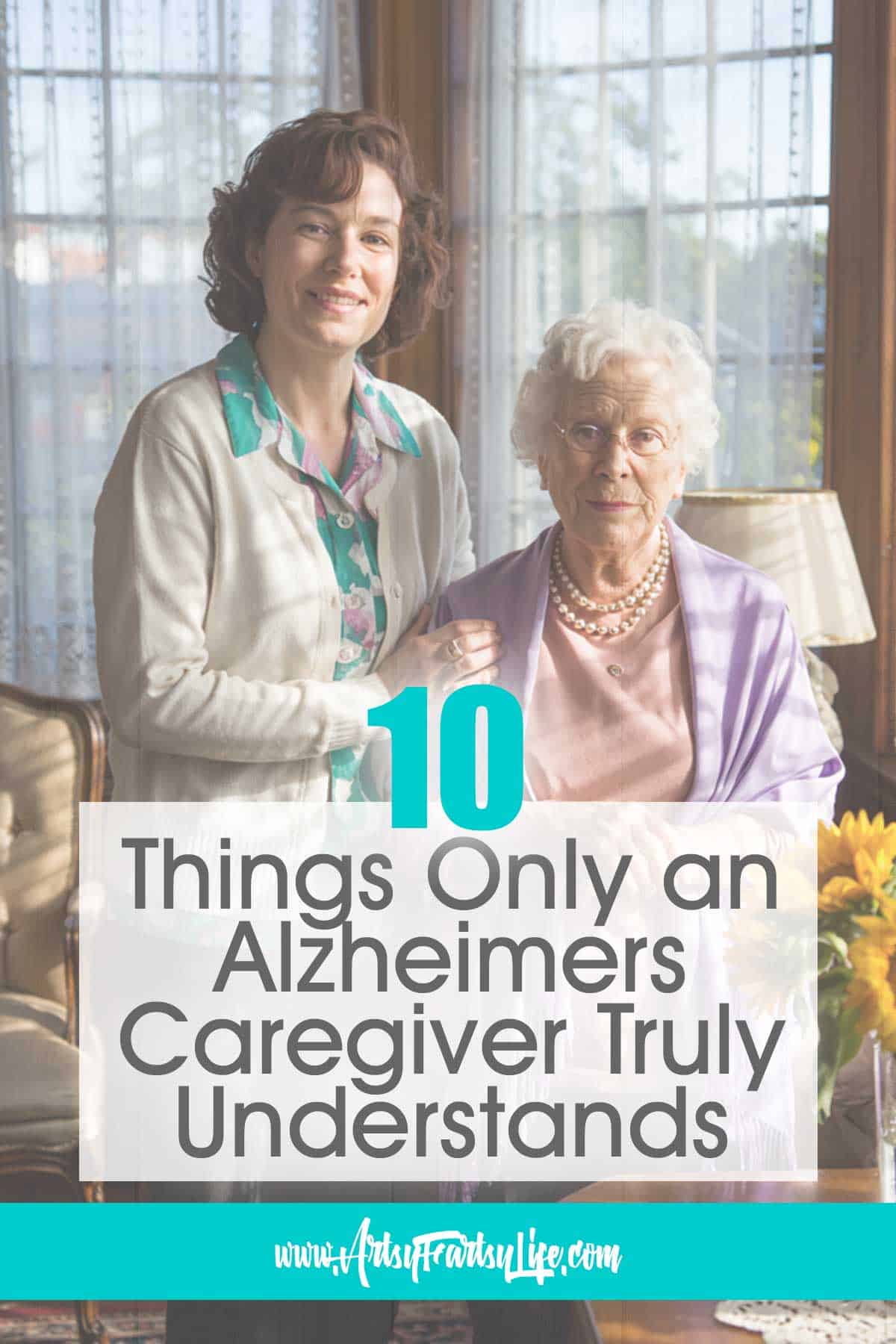If you are an Alzheimer or Dement caregiver, you might notice that your loved one is hoarding things, well beyond what would be considered a normal level. Today we are going to talk about hoarding, plus pitfalls, tips and ideas for how to help clean it up a bit!
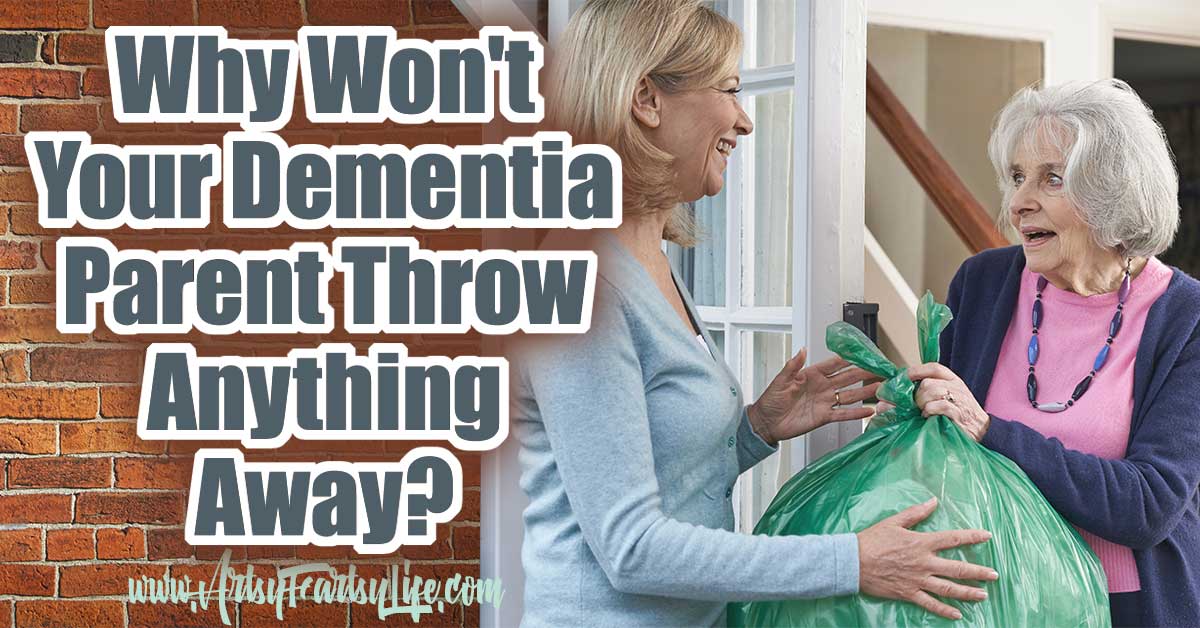
Our Moms Hoarding Story
After our Mom with dementia moved in, we started noticing a real hoarding tendency... food, papers, pens, calendars and especially plastic flowers and pillows. Looking back on when she was living alone, that really wasn't new, we just hadn't been seeing it in action enough to really notice.
That is one of the things that is so insidious about dementia and Alzheimers. Our loved one's early decline is so subtle and progressive that sometimes it is hard to see the warning signs of upcoming problems.
I did notice that there were a lot of boxes around Mom's condo when I went over (come to find out she had whole rooms dedicated to hiding all the plants and pillows that she had ordered). And there was that one time she signed up for 3 different meal delivery services and had food boxes and bags piled around the kitchen and a refrigerator and freezer full of food... but still we didn't really realize what was going on.
Is Hoarding An Alzheimers or Dementia Symptom?
Before we talk about hoarding and go over some tips about what to do, let's talk about whether hoarding is an actual symptom of the disease.
This article from the Mayo Clinic says that there is a link between Frontotemporal Dementia and hoarding behaviors. Many dementia people have a mixed diagnosis of Alzheimers, Frontotemporal or even Wernicke Korsakoff Syndrome that are all under the umbrella of dementia.
That said, there wasn't a huge amount of research available linking it like there are with falls or memory loss.
That said, from the responses in the Caregivers groups I belong to on Facebook, hoarding is for sure something that we are having to deal with on a daily basis!
Why Do Dementia and Alzheimers Patients Hoard?
So if it not a huge symptom of the disease, why do they do it? Why keep everything?
It seems like there are some common reasons our elderly parents might be hoarding...
History
It could be a holdover from the Depression era and rationing during the wars. As a 50 something woman, I have never lived in a time where basic goods and products were not available (well that one time they rationed gas and everyone lost their minds, but not really).
Our parents lived in in time where their parents lost everything, including their homes so using that lens, hoarding doesn't seem like that bad an idea.
And considering the fact that the past often seems more "real" than the present to them, this could be having a big influence on their current behavior.
Lack During Childhood
Our Mom grew up with a single mother after her father died when she was two years old. They did not have much at all in their home and her mother struggled to provide basics like food and clothing.
Again, childhood things may be overriding their current situations and causing weird behavior.
Loss of Executive Function
According to the UCSF Memory and Aging Center, executive function helps with "initiating and inhibiting context-specific behavior, moral reasoning, decision-making."
This is a fantsy pants way of saying that Mom doesn't make the best decisions anymore about what is vital to keep and what could safely be tossed away.
Don't Want To "Lose" Anything
Having dementia must be so darn frustrating. I know I get freaked out when I think I have lost my glasses and I don't have memory loss.
So one of the hoarding things might be to have LOTS of whatever they hoard so that they can't "lose" them all at the same time.
Unknown
Like many of the things about dementia, the cause of your loved one's hoarding may never be known. They may have lead an opulent lifestyle free of want, and still be a hoarder. Especially since what they save oftentimes is not valuable at all.
It is really tempting to try and put my Psychology degree to good use and come up with a "this caused that" diagnosis of why Mom hoards, but at the end of the day, it doesn't really matter why, we just need to know how to manage it to keep her and our house safe.
What Do Dementia and Alzheimers Patients Hoard?
There are all whole range of things that our loved ones hide, including...
- Food
- Money
- Craft Supplies
- Tissues
- Empty Bottles
- Cans
- Jars
- Teabags
- Sugar Packets
- Newspapers
- Magazines
- Books
- Pens
- Pads of Paper
- Garbage
- Clothes
Some of these are pretty harmless and some can be downright deadly if we don't know they are keeping them tucked away around the house.
Tips & Strategies For Dementia Hoarders
Okay, now let's get down to brass tacks and talk about what we can do to help our loved ones! We will go from easy peasy to "holy crap, we gotta fix this now"!
Clothing
Our Mom had a LOT of clothing (like 3 closets full) that don't fit her anymore because she has lost so much weight. When she moved in we needed to consolidate it all into one closet so stuff had to go... but how when she wanted to keep it all?
We told her that she could keep it ALL!
Seriously, you have to start with a super happy outlook on it so that they are not defensive about giving things up.
And then we looked at everything one piece at a time, making up some "rules" as we went along based on what she liked or didn't like. For example, we had a "no sleeveless" because she doesn't like that she has "old lady arms" now.
And I talked A LOT about how we were going to donate it to a local hospice thrift store. Your Mom may feel better if you say it is going to a religiously affiliated thrift store like the Salvation army.
Pumping her up that she was going to be helping other people was a great motivator.
Pro Tip: As soon as she said something was a "donate" I took it out of the room and separated it into two piles of donate and trash. Getting them out of her sight right away was vital so she didn't go back through the piles and keep some of the things that were already in the going out piles. My husband (her son) was taking things from outside the door to the garage as soon as we got some built up.
Money
I heard more than once that loved ones were hoarding money around their house so that no one could "steal" it from them.
This one is going to depend on how much they actually need cash to live on. We have a POA on all Mom's finances so she is free to hoard all the cash she can get her hands on, she doesn't need it to pay bills.
Pro Tip: It would be super easy to throw out money that is in what looks like garbage, so if you are cleaning out garbage from your parents house, make sure to check everywhere for cash.
Tissues
As a woman who generally has a tissue tucked up her sleeve, I can sympathize with wanting to have tissues around. That said, many people said their loved ones had boxes and boxes of them hidden all around the house.
Now I think this one is a safety issue. If your parent or partner smokes, you are going to have to do sweeps and get rid of them for sure as they are a fire hazard. If your house is generally not a fire trap, maybe overlook the piles of tissues and clean them up when you can.
Empty Bottles, Cans, Jars, Margarine Containers
Whoa nellie, this is a hot button issue for even people who are not dementia patients. It is easy to think that you are saving perfectly good storage containers, only to find out that your cupboards are full of garbage that is just a little cleaner than food waste.
This one is going to have to be a space and safety issue. If your loved one is hoarding piles of plastic margarine tubs, there is much less chance of breakage and cuts from glass than if they are hoarding bottles and jars.
You might be able to convince them that the church is doing a canning drive or that you are donating them to a homeless shelter. Of course, you will just throw them out or recycle them responsibly, but sometimes that little white lie is necessary to help them get rid of the piles of containers.
For real, saying that "these containers you saved are perfect to help the community center" is a much easier conversation that screeching about how they never throw anything away.
Food
Oh the kitchen, full of salmonella and E coli risks.
If your loved one hoards food, you are going to have be more aggressive about "helping" to keep things organized and less life threatening. For real, if your Mom is living alone and has cans from 10 years ago, it can be a life or death situation.
One reason they might not notice things are out of date is that the dates on cans and products are SUPER small and hard to read. Another thing might be just a general worry that they will run out of food. It could also be that managing cleaning out a whole refrigerator is just too overwhelming a task.
If your Mom hoards food around her room to "save for later" when she is hungrier, you are going to have to monitor this closely. We found a bowl of Shepards Pie under her side table that she was "saving" and got really mad when I took it away.
For this kind of clean up, you might have to "hire" help. As an example, we had our late teen daughter clean Mom's house every two weeks for pay.
For some reason having Britty clean up her kitchen was much less hurtful than me going in to do it. This may work with someone from a cleaning service too!
Everything Else
I think you get the drift... getting rid of the "stuff" is not going to be easy, but there are some ways to mitigate the anger you will be getting from them when you try to clean up.
Remember to be a helper not a boss, dementia parents hate to feel like they are being told what to do or like they are doing something weird or crazy.
Pick Your Battles
Let's talk about what needs to go... and for sure it can't be everything all at once or they will lose their marbles.
Instead of "yelling" about stuff every time you see your loved one's room or home, pick one thing that you are going to try to make a dent in each time. Gently try and bring it around to it being their idea that you are helping them get rid of it instead of being a big old bossy pants (I tend to want to rush in fix things... that NEVER works!)
Safety Issue
We adopted our kids from foster care so we got a LOT of training about how to pick battles and one that is ingrained now are "safety issues".
Having piles of books that your loved one can fall over is a safety issue. Having cardboard boxes next to the stove, tissues by electrical outlets or piles of glass jars stacked up are all huge red flag, safety issues.
Tackle them first!
It can feel like everything is such a mess that you just have to start at one end and work to other, but really there are some things more concerning than others. Having drawers full of sugar packets might draw ants, but probably won't start fires.
Lots of craft supplies might be hard to manage, but are much less of a hazard than say having outdated food in the refrigerator.
Clean Out When They Are Not There
Now we are getting into lying and subterfuge... which is okay when your loved one has dementia!
Arrange for someone to take your loved one out of the house and clean as much as you can without it being super obvious. Start with the safety issues and get as much done as possible, focusing primarily on things that are scary and then ones that they might not notice.
You might want to have a "witness" with you while you clean. I have heard of loved ones saying that valuable things had been stolen (in their minds they are valuable) and family members and police have been called.
Take Completely Out of the House
This may be the best tip of the day. You HAVE to take things completely out of the house!
Simply cleaning and putting in the garbage is not going to work sometimes. I heard more than one story about how a family did a clean and put all the stuff out at the curb in garbage bags, only to find it all restored when their Dad found it and brought it all right back in.
Generally a hoarder is super attached to their stuff and this might be even more so when that hoarder has dementia!
Try and Try Again
Now, you might be thinking reading all this that I have a perfect dementia Mom and I can just do whatever I want to keep her safe... WRONG! That closet cleanout? Took about 2 weeks of me asking every day if Mom was willing to go through her stuff, while boxes and boxes sat around our house and got in everyone's way.
But it is was worth it to wait until a day that she was in a good mood and ready to tackle a big project like that.
We also snuck into her condo when she was out and cleaned up poop and pee from her cat and dog so she wouldn't get kicked out. We also went through the refrigerator to take out expired food and get rid of maggots in her cupboards.
None of this has been pretty... none of dementia is.
But remember, they may be mad at you today or freak out when you take their treasures, but they will forget eventually. As caregivers that Groundhog Day effect of living the same day over and over again works in our favor sometimes too!
Hang in there... you got this!
